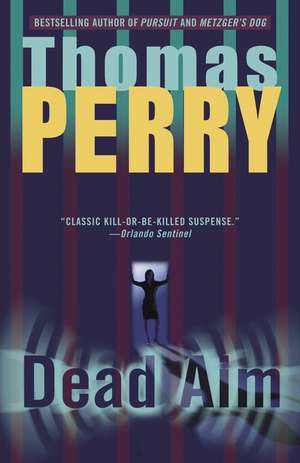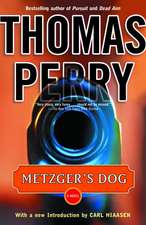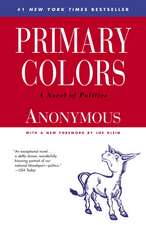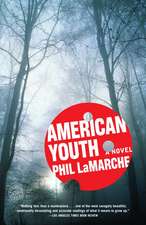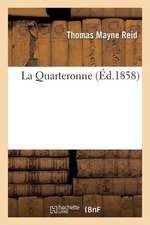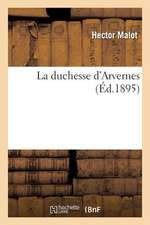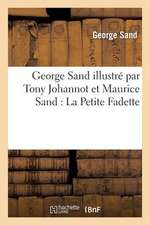Dead Aim
Autor Thomas Perryen Limba Engleză Paperback – 31 ian 2006
Vezi toate premiile Carte premiată
Audies (2011)
–New York Daily News
Robert Mallon has lived for ten quiet years in affluent Santa Barbara, California, when an encounter on a beach with a mysterious young woman shatters his peaceful, carefully constructed life. Despite Mallon’s desperate attempts, he loses her, and becomes obsessed with discovering why. He hires detective Lydia Marks to uncover the secrets of this stranger’s life, and what they learn propels them into a terrifying world of sinister secrets and deadly hatreds. Targeting Mallon is the master hunter Parish, a man with an expert understanding of evil, who preys on rich people’s desires for dominance and revenge. Mallon is drawn into a lethal struggle with this deadly adversary–and then another, and another, and another.
Preț: 120.37 lei
Nou
Puncte Express: 181
Preț estimativ în valută:
23.04€ • 23.74$ • 19.45£
23.04€ • 23.74$ • 19.45£
Carte tipărită la comandă
Livrare economică 03-17 martie
Preluare comenzi: 021 569.72.76
Specificații
ISBN-13: 9780812969832
ISBN-10: 0812969839
Pagini: 378
Dimensiuni: 133 x 204 x 22 mm
Greutate: 0.42 kg
Editura: Random House Trade
ISBN-10: 0812969839
Pagini: 378
Dimensiuni: 133 x 204 x 22 mm
Greutate: 0.42 kg
Editura: Random House Trade
Notă biografică
Thomas Perry won an Edgar Award for The Butcher’s Boy, and Metzger’s Dog was a New York Times Notable Book. Vanishing Act was chosen as one of the 100 Favorite Mysteries of the Century by the Independent Mystery Booksellers Association, and Pursuit was a national bestseller. Perry lives in Southern California with his wife and two daughters.
From the Hardcover edition.
From the Hardcover edition.
Extras
CHAPTER 1
The shot was an explosion that spewed a shower of bright sparks from the pistol's muzzle into the darkness and kicked the barrel upward, but the arm of the shooter quickly straightened to level it again. The shooter fired the second and third shots into the lighted interior of the car, and the late-night silence returned. After a few seconds, crickets began to chirp tentatively again from nearby yards.
There were three holes punched through the rear window of the car, and even from his vantage across the alley behind the shooter, Parish could see that Mark Romano's head had been pounded forward, and the windshield had been sprayed nearly opaque with his bright red blood.
Parish watched as one of the women gently but firmly placed her arm around the shooter's left shoulder and took the gun from the right hand. The waiting escape car rolled up and within a few heartbeats the shooter had been hustled into the back seat. Parish leaned in to speak softly to the driver. "Go ahead. We'll finish up here."
The car moved off down the alley with its lights still out. Parish walked into the garage, stopped by the side of Romano's car, and bent to stare into the still-lighted interior at the bloody face to be sure there was no possibility of life. He reached across the body to the dashboard and took the remote control unit. He closed the car door, stepped out of the garage, and pushed the remote control button to bring the door down to cover the scene.
As he turned, Spangler emerged from the darkness at his side and pointed at the back of a house down the alley. "There was a face in that window for a second."
"Better take care of it before we go," whispered Parish. "They haven't had enough time to get the shooter out of the area."
The two men walked quickly and silently up the alley. They were both tall, but they moved toward the house with a surprising ability to blend into their surroundings, passing through each shadowy space beside the garages, moving along rows of garbage cans to make their shapes get lost to the eye among the many others in the dark alley.
The house was two lots down from Mark Romano's-they had waited for a night when the nearest neighbors were away-so the face could not have seen much from that window, beyond the six-foot cinder-block wall that separated the alley from the yard. Parish and Spangler moved to the wall, barely glancing at each other, as though they had done this so many times that each knew the steps, neither needing to check where the other was.
In seconds Parish was up and over the wall into the yard behind the house, and Spangler had made his way along the fence beside it. As Spangler went over the fence and dashed up the low steps toward the kitchen door, he could hear Parish breaking the glass in the window at the back of the house, and he hit the door with his shoulder before the musical sound of glass hitting the floor inside the house had stopped.
The door flew inward, cracked into the wall, bounced, and swung back, but Spangler was already across the small kitchen, his gun drawn, slipping up the hallway toward the back bedroom at a run. He went low, held his pistol ahead of him, and stepped into the doorway.
He saw a man in boxer shorts standing inside the room leaning against the wall, both hands on an aluminum baseball bat, waiting for Parish to try to climb in through the broken window beside him. Spangler fired once into the man's chest as Parish fired twice through the window into the room.
Spangler's head spun so he could see what Parish had shot. It seemed at first that it was just a lump in the blanket, but then Spangler saw the telephone cord leading from the nightstand under the covers. He tore the blanket and sheet aside to reveal the body of the woman, the telephone receiver still clutched in her hand.
He moved to the window, pulled the sash up, and stepped back to let Parish climb in. Parish glanced at the man on the floor as he hurried to the bed where the woman lay. He snatched the telephone from her fingers, put it to his ear, and smiled as he set it in its cradle. "Dial tone. She hadn't gotten the call off yet."
"Close, though," said Spangler. He turned to go.
"Not yet." He nodded at the dead man below the window. "That bat isn't the right size for him, is it?"
Spangler whispered, "Kids?"
"Better check."
Spangler followed Parish into the hallway, mirroring his rapid, efficient movements. Parish stopped at each doorway on the left, put his head inside, turned to look both ways, then moved on. Spangler took the doorways on the right. Parish stopped at the end of the hall, where the door was closed. He tried the handle, found that it would not turn, and nodded to Spangler. Then he stepped back and kicked.
As the door flew open, Spangler stepped in after it. He decided that the boy crouching on the floor at the far end of the bunk bed must be nine or ten, and the little sister he had pushed behind him would be around five. Parish and Spangler seemed to have the same thought, which was that they must make use of the children's shock and immobility before they tried to run or crawl under something, as children often did. Both men centered their shots in the children's foreheads.
Parish and Spangler left the room and continued up the hallway. It did not make sense to go out the way they had come. The only car in the alley had been the one that had been used to spirit the shooter away, and there was nothing left near Romano's body that they needed to think about any further. They walked across the small, drab living room, carefully avoided a skateboard that had been left near the front door, slipped the latch, and stepped outside. They made their way around the corner to the car they had parked there, and Spangler drove them up the street toward the freeway entrance.
Forty-five minutes later, when they were driving north beside the ocean, Parish opened his window and tossed the remote control for Mark Romano's garage door opener out onto the pavement. The little plastic case broke apart with the impact and the pieces bounced a few times, cartwheeling and then sliding to a stop a few feet apart in the right lane, where they would be crushed to bits by the next car, or the next, or the one after that.
From the Hardcover edition.
The shot was an explosion that spewed a shower of bright sparks from the pistol's muzzle into the darkness and kicked the barrel upward, but the arm of the shooter quickly straightened to level it again. The shooter fired the second and third shots into the lighted interior of the car, and the late-night silence returned. After a few seconds, crickets began to chirp tentatively again from nearby yards.
There were three holes punched through the rear window of the car, and even from his vantage across the alley behind the shooter, Parish could see that Mark Romano's head had been pounded forward, and the windshield had been sprayed nearly opaque with his bright red blood.
Parish watched as one of the women gently but firmly placed her arm around the shooter's left shoulder and took the gun from the right hand. The waiting escape car rolled up and within a few heartbeats the shooter had been hustled into the back seat. Parish leaned in to speak softly to the driver. "Go ahead. We'll finish up here."
The car moved off down the alley with its lights still out. Parish walked into the garage, stopped by the side of Romano's car, and bent to stare into the still-lighted interior at the bloody face to be sure there was no possibility of life. He reached across the body to the dashboard and took the remote control unit. He closed the car door, stepped out of the garage, and pushed the remote control button to bring the door down to cover the scene.
As he turned, Spangler emerged from the darkness at his side and pointed at the back of a house down the alley. "There was a face in that window for a second."
"Better take care of it before we go," whispered Parish. "They haven't had enough time to get the shooter out of the area."
The two men walked quickly and silently up the alley. They were both tall, but they moved toward the house with a surprising ability to blend into their surroundings, passing through each shadowy space beside the garages, moving along rows of garbage cans to make their shapes get lost to the eye among the many others in the dark alley.
The house was two lots down from Mark Romano's-they had waited for a night when the nearest neighbors were away-so the face could not have seen much from that window, beyond the six-foot cinder-block wall that separated the alley from the yard. Parish and Spangler moved to the wall, barely glancing at each other, as though they had done this so many times that each knew the steps, neither needing to check where the other was.
In seconds Parish was up and over the wall into the yard behind the house, and Spangler had made his way along the fence beside it. As Spangler went over the fence and dashed up the low steps toward the kitchen door, he could hear Parish breaking the glass in the window at the back of the house, and he hit the door with his shoulder before the musical sound of glass hitting the floor inside the house had stopped.
The door flew inward, cracked into the wall, bounced, and swung back, but Spangler was already across the small kitchen, his gun drawn, slipping up the hallway toward the back bedroom at a run. He went low, held his pistol ahead of him, and stepped into the doorway.
He saw a man in boxer shorts standing inside the room leaning against the wall, both hands on an aluminum baseball bat, waiting for Parish to try to climb in through the broken window beside him. Spangler fired once into the man's chest as Parish fired twice through the window into the room.
Spangler's head spun so he could see what Parish had shot. It seemed at first that it was just a lump in the blanket, but then Spangler saw the telephone cord leading from the nightstand under the covers. He tore the blanket and sheet aside to reveal the body of the woman, the telephone receiver still clutched in her hand.
He moved to the window, pulled the sash up, and stepped back to let Parish climb in. Parish glanced at the man on the floor as he hurried to the bed where the woman lay. He snatched the telephone from her fingers, put it to his ear, and smiled as he set it in its cradle. "Dial tone. She hadn't gotten the call off yet."
"Close, though," said Spangler. He turned to go.
"Not yet." He nodded at the dead man below the window. "That bat isn't the right size for him, is it?"
Spangler whispered, "Kids?"
"Better check."
Spangler followed Parish into the hallway, mirroring his rapid, efficient movements. Parish stopped at each doorway on the left, put his head inside, turned to look both ways, then moved on. Spangler took the doorways on the right. Parish stopped at the end of the hall, where the door was closed. He tried the handle, found that it would not turn, and nodded to Spangler. Then he stepped back and kicked.
As the door flew open, Spangler stepped in after it. He decided that the boy crouching on the floor at the far end of the bunk bed must be nine or ten, and the little sister he had pushed behind him would be around five. Parish and Spangler seemed to have the same thought, which was that they must make use of the children's shock and immobility before they tried to run or crawl under something, as children often did. Both men centered their shots in the children's foreheads.
Parish and Spangler left the room and continued up the hallway. It did not make sense to go out the way they had come. The only car in the alley had been the one that had been used to spirit the shooter away, and there was nothing left near Romano's body that they needed to think about any further. They walked across the small, drab living room, carefully avoided a skateboard that had been left near the front door, slipped the latch, and stepped outside. They made their way around the corner to the car they had parked there, and Spangler drove them up the street toward the freeway entrance.
Forty-five minutes later, when they were driving north beside the ocean, Parish opened his window and tossed the remote control for Mark Romano's garage door opener out onto the pavement. The little plastic case broke apart with the impact and the pieces bounced a few times, cartwheeling and then sliding to a stop a few feet apart in the right lane, where they would be crushed to bits by the next car, or the next, or the one after that.
From the Hardcover edition.
Recenzii
“Classic kill-or-be-killed suspense.”
–Orlando Sentinel
“The reader is propelled through the plot like a bullet. The tension never ebbs.”
–Milwaukee Journal Sentinel
“Riveting suspense, a host of believable major and minor characters and a slam-bam ending.”
–Houston Chronicle
“Smart, funny, and nasty; it will grab you and not let go.”
–The Washington Post
–Orlando Sentinel
“The reader is propelled through the plot like a bullet. The tension never ebbs.”
–Milwaukee Journal Sentinel
“Riveting suspense, a host of believable major and minor characters and a slam-bam ending.”
–Houston Chronicle
“Smart, funny, and nasty; it will grab you and not let go.”
–The Washington Post
Descriere
In this explosive new novel by the Edgar Award-winning author of "The Butcher's Boy," an unsuspecting man tries to help a young woman on the edge--and finds himself drawn into a lethal struggle with a deadly adversary . . . and then another, and another, and another.
Premii
- Audies Finalist, 2011
